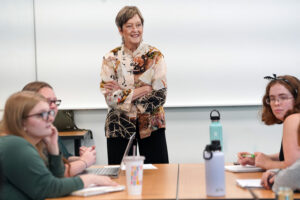When she arrived in Tunisia to teach English to a roomful of teenagers, former Peace Corps director Jody Olsen, then in her 20s, worried she’d made a mistake.

“My first thought was to head for the door,” she said of the 1966 experience that ended up charting her course. Instead, “I said, ‘Good morning, I’m Mrs. Olsen,’ and my life began.”
She shared her longtime relationship with service last week with students at the University of Mary Washington’s College of Education (COE) in Seacobeck Hall. Plucking tales from her lengthy career, including her time as Peace Corps director amid the COVID-19 pandemic, she wove a theme. International experiences – especially teaching abroad with the Peace Corps – can build the foundation for richer careers in the classroom.
That’s key for senior education major Emma Miller, who hopes to land a Peace Corps position next year. If so, she’ll join nearly 300 UMW alumni who’ve served the government agency, helping countries develop across the globe and earning Mary Washington a No. 7 spot among top-producing small schools in the most recent annual ranking.
Olsen had been a senior at the University of Utah when President John F. Kennedy’s famous words – “ask not what your country can do for you, ask what you can do for your country” – stirred something in her. She signed up for the Peace Corps, formed just five years before.
She knew she’d live overseas for two years but little else about the journey ahead. In North Africa, she said, she felt unprepared for a sudden new life and its language, culture and dress. It forced her to reconsider all that she’d thought and believed.
But she carved out a way of communicating with her students and wrapped herself in their world, having tea with the women, hooking rugs with the girls, learning the Arabic language and earning respect. “It took months,” she said. “I had to make mistakes. I had to listen, listen, listen.”
Her patience paid off. The experience laid the groundwork for a deeper understanding of people and classroom dynamics and, ultimately, a spot at the top of the Peace Corps. Director from 2018 to 2021, she made the “most difficult” decision of her life in May 2020 – cutting short service for all 7,000 volunteers and bringing them home.
Twenty-five hundred are back on the ground, making a difference in 58 countries. Two-thirds of them teach, Olsen said. Others choose fields like health care and agriculture.
Olsen, who now teaches at the University of Maryland, shared that story not once, but twice, at Mary Washington on Tuesday, Oct. 3, appearing at a Community Foundation of the Rappahannock River Region event in the Jepson Alumni Executive Center before bringing her message to students.
She addressed the process and benefits of joining the Peace Corps, including a fellowship worth thousands of dollars toward graduate school, then welcomed comments and questions.
“Having an international experience strengthens us as both teachers and administrators,” she said, giving a nod to COE Dean Pete Kelly, who shared his own volunteer adventures in the Polynesian country of Tonga. The opportunity to absorb other cultures is “such a gift,” he said, “particularly in education.”
UMW junior Savannah Sinor, an international affairs and French major, hopes to be on the receiving end of that gift, starting with studying abroad in Guatemala next year, before moving on to the Peace Corps. “I’ve just always wanted to help people,” said Sinor, who asked how to make her application stand out. “I think the Peace Corps is a great way to do that.”


